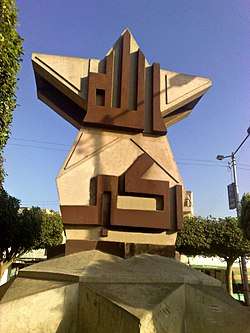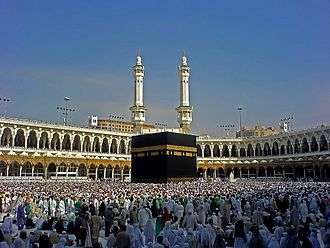Takbir
The Takbir (تَكْبِير, Arabic pronunciation: [tak.biːr], "magnification [of God]") [lower-alpha 1] is the Arabic phrase ʾAllāhu ʾakbaru (ٱللَّٰهُ أَكْبَرُ, Arabic pronunciation: [ʔaɫ.ɫaː.hu ʔak.baru] ![]()
| Part of a series on |
| God in Islam |
|---|
 |
|
List
|
|
|
| Part of a series on |
| Islam |
|---|
 |
|
It is a common Islamic Arabic expression, used in various contexts by Muslims; in formal Salah (prayer),[1] in the Adhan (Islamic call to prayer),[6] as an informal expression of faith, in times of distress or joy, or to express resolute determination or defiance.
Exegesis
The Arabic word كَبِير (kabīr) means great from the Semitic root k-b-r. The Arabic word أَكْبَر (ʾakbar) is the elative form (greatest) of the adjective kabīr. When used in the Takbīr it is usually translated as greatest, but some authors translate it as greater.[7][8][9] The term Takbīr itself is the stem II verbal noun of the triliteral root k-b-r, meaning "great", from which akbar "greater" is derived. The form Allāhu is the nominative of Allah, meaning 'God'.[10][11]
Usage in Islamic rituals

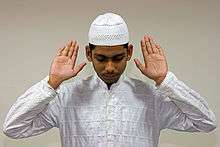
This phrase is recited by Muslims in many different situations. For example, when they are very happy, to express approval, to prevent a Muslim from becoming prideful by reminding them that Allah is their source of success, or as a battle cry, during times of extreme stress. The phrase is not found in the Quran, which does not refer to God as akbar, but uses the name al-Kabīr "The Great" or Kabīr "Great", commonly translated as "Most Great" (13:9, 31:30, 22:62, 34:23, 40:12, 4:34).
In prayer
The phrase is said during each stage of both salah (obligatory prayers, performed five times a day), and nafl (supererogatory prayers, performed at will). The Muslim call to prayer (adhan) by the muezzin and to commence prayer (iqama) also contains the phrase.[6]
Following births and deaths
The phrase is used after the birth of a child as a means of praising God.[12] It is also part Islamic funeral and burial customs.[13]
During the Eid Festival and the Hajj
During the festival of Eid al-Adha and the days preceding it, Muslims recite the Takbīr. This is particularly the case on the Day of Arafah.[14][14]
Other social usage
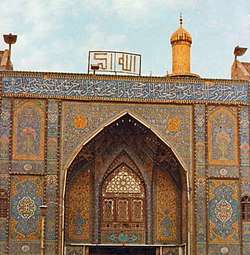
The expression "Allah Akbar" can be used in a variety of situations, from celebrations to times of grief.
In a historical account by someone who was present both at the birth of Abd Allah ibn al-Zubayr and at his funeral, the author observes that "Allahu Akbar" was said on both occasions.[16]
In times of distress
The phrase is sometimes used during distress.
Just before Garuda Indonesia Flight 152 crashed into the jungle near Medan, Indonesia, the pilot screamed "Aaaaaaah! Allāhu akbar" into his radio. According to a radio communication transcript, the pilot's conversation with the air controller had been in English, but his last words were the takbir as the plane crashed on September 26, 1997, killing all 234 people aboard in Indonesia's deadliest crash. It was suspected that the crash may have been due to either disorientation or turbine engine failure caused by local dense smog resulting from forest fires.[17][18]
In times of joy and gratitude
When Reshma Begum was discovered alive 17 days after the 2013 Savar building collapse in Bangladesh which killed 1129 people, crowds jubilantly cried "Allāhu akbar" to express their joy and gratitude that she had survived.[19][20]
As a multi-purpose phrase, it is sometimes used by Arab football commentators as an expression of amazement, or even as a football chant.[21]
In battles
It has been used historically as a battle cry during war.[22] Ibn Ishaq's Life of Mohammed narrates at least two incidents in which the phrase was used.
"When the apostle raided a people he waited until the morning. If he heard a call to prayer' he held back; if he did not hear it he attacked. We came to Khaybar by night, and the apostle passed the night there; and when morning came he did not hear the call to prayer,' so he rode and we rode with him, and I rode behind Abii Talba with my foot touching the apostle's foot. We met the workers of Khaybar coming out in the morning with their spades and baskets. When they saw the apostle and the army they cried, `Muhammad with his force,' and turned tail and fled. The apostle said, 'Allah akbar! Khaybar is destroyed. When we arrive in a people's square it is a bad morning for those who have been warned.'" (page 511) "So he got off his horse and came at him and 'Ali advanced with his shield. `Amr aimed a blow which cut deeply into the shield so that the sword stuck in it and struck his head. But 'Ali gave him a blow on the vein at the base of the neck and he fell to the ground. The dust rose and the apostle heard the cry, 'Allah Akbar' and knew that 'Ali had killed him." (page 456) [23]
Protest
During the Iranian Revolution of 1979, it was shouted from rooftops in Iran during the evenings as a form of protest. This practice returned in the 2009 Iranian presidential election protests,[24][25] which protested the election results.[26]
Usage by extremists
Almost all Muslim extremists have used the phrase while committing violent acts, and the phrase has been heard in many famous terrorist attacks. This usage has been denounced by other Muslims.[21][16]
The phrase was invoked by fighters throughout the First and Second Chechen Wars, the Abu Sayyaf group in the Philippines, ISIS, the Taliban and multiple groups in Algeria. Jonathan Matusitz has written:[27][28]
"Today, it is still the mujahedin's most repeated battlecry; it was shouted by the 9/11 hijackers a few seconds before hitting the Twin Towers. Shouted and heard by millions for centuries, this battle cry clearly evinces the religious nature of Islamist methods and objectives."
Matusitz argues that these beheadings are a form of ritual murder which he defines as "a sequence of repeated physical, sexual, and/or psychological assaults, along with a methodical use of symbols, ceremonies, and/or machinations".[27]
Sometimes the use of the phrase is mistakenly assumed to be an indication of terrorism.[21]
After the September 11 attacks in 2001, the FBI released a letter reportedly handwritten by the hijackers and found in three separate locations on the day of the attacks—at Dulles International Airport, at the Pennsylvania crash site, and in hijacker Mohamed Atta's suitcase. It included a checklist of final reminders for the 9/11 hijackers. An excerpt reads: "When the confrontation begins, strike like champions who do not want to go back to this world. Shout, 'Allāhu akbar,' because this strikes fear in the hearts of the non-believers." Also, in the cockpit voice recorders found at the crash site of Flight 93, the hijackers are heard reciting the Takbīr repeatedly as the plane plummets toward the ground and the passengers attempt to retake control of the plane.[29][30][31][32]
When in March 2002 Maryam Mohammad Yousif Farhat of Hamas, popularized as "Umm Nidal" (and subsequently elected to the Palestinian Legislative Council),[33] learned that her 17-year-old son had died during a suicide attack in which he killed five students of a pre-military school, she celebrated by proclaiming "Allāhu akbar" and giving out boxes of halva and chocolates.[34][35]
"Allāhu akbar" was also heard in the beheading video of Nick Berg in Iraq in 2004,[36] in the videotapes associated with the 2007 Fort Dix attack plot,[37][38][39] during an incident aboard American Airlines Flight 1561 in 2011,[40] the 2012 Midi-Pyrénées shootings,[41] the 2014 Jerusalem synagogue attack,[42] the 2015 Charlie Hebdo shooting,[43] the November 2015 Paris attacks,[44] and the Assassination of Andrei Karlov in 2016.
In 2008, Aafia Siddiqui is alleged to have fired at US interrogators while yelling "Allāhu akbar".[45][46][47][48] In 2010 Faisal Shahzad used the term after receiving a life sentence for his attempted bombing.[49][50] The phrase was also invoked by Nidal Hasan, prompting Charles Krauthammer to framing the Fort Hood shooting as being caused by ideology.[51]
In videos released during the course of the Syrian Civil War, Free Syrian Army, Al-Nusra Front, other rebel and Islamist groups and ISIL forces are heard shouting "Takbir" and "Allāhu akbar" in the background while fighting. Even more "secular" groups such as the Free Syrian Army - Operation Southern Storm have been heard yelling the phrase before the firing of heavy weapons.[52] In 2019 during the Syrian civil war, militants shouted "Allahu akbar" before firing their mortar blasts.[53]
Professor Khaled A. Beydoun writes that the association of the phrase "Allah Akbar" with terrorism has been exacerbated by mass media and television pundits. He points out that fictional films and shows also utilize it as a cinematic trope further cementing the association.[54]
On flags
The phrase Allāhu akbar is written on the center of the flag of Iraq, 22 times along the borders of the central white stripe on the flag of Iran, and beneath the shahada in the flag of Afghanistan in white script on the central red background as determined by the 2004 draft constitution.
Iraq
During the Gulf War in January 1991, Saddam Hussein held a meeting with top military commanders, where it was decided to add the words Allāhu akbar (described as the Islamic battle cry)[55] to Iraq's flag to boost his secular regime's religious credentials, casting himself as the leader of an Islamic army.[56][57] Hussein described the flag as "the banner of jihad and monotheism".[58]
In 2004, the US-picked Iraqi Governing Council approved a new flag for Iraq that abandoned symbols of Hussein's regime, such as the words Allāhu akbar.[56][59] In January 2008, however, Iraq's parliament passed a law to change the flag by leaving in the phrase, but changing the calligraphy of the words Allāhu akbar, which had been a copy of Hussein's handwriting, to a Kufic script.[60][61] The Iraqi flag under Hussein had each of the two words of the phrase written in one of the spaces between the stars on the central band; the 2008 flag, while leaving the phrase in, removes the stars.
Iran
The phrase Allāhu akbar is written on the flag of Iran, as called for by Article 18 of the Constitution of the Islamic Republic of Iran.[62] The phrase appears 22 times on the flag.[63]
Afghanistan
The Afghan constitution that came into force on January 4, 2004, required that Allāhu akbar be inscribed on Afghanistan's national flag.[64]
Waziristan
A resistance movement that fought British rule in Waziristan, Pakistan, in the 1930s used a red flag bearing Allāhu akbar in white letters.[65]
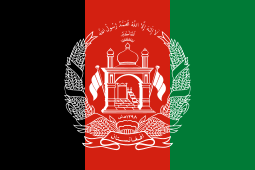 Flag of Afghanistan, with the phrase beneath the Shahada
Flag of Afghanistan, with the phrase beneath the Shahada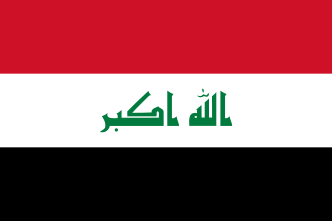 Flag of Iraq, with stylized Kufic script, introduced in 2008
Flag of Iraq, with stylized Kufic script, introduced in 2008 Flag of Iran, introduced in 1980
Flag of Iran, introduced in 1980.svg.png) Flag of 1930s Waziristan (Pakistan) resistance movement
Flag of 1930s Waziristan (Pakistan) resistance movement
Mistranslation
According to a 2016 analysis report by the Middle East Media Research Institute MEMRI, the phrase "Allahu Akbar" – which means "Allah is the greatest" – is routinely misunderstood and mistranslated by Western media.[66] As explained by MEMRI in its 2016 analysis, "the rendering of Allah akbar in the U.S. media as 'God is great' [is misleading because it] omits the aspect of superiority in the word akbar (which means 'greater' or 'greatest,' not merely 'great') and blurs the specific reference to Allah rather than to another deity."
See also
- Alhamdulillah
- Alláh-u-Abhá
- Battle cry
- Deo optimo maximo
- Dhikr
- Hallel
- Hallelujah
- Glossary of Islam
- Quran
- Ṣabr
- Tawhid
- Jai Shri Ram, Hindi expression, translating as "Glory to Lord Rama"
Notes
- Also transliterated as Takbīr, Takbiir or Takbeer.
References
- "The Times of the Five Daily Prayers". Retrieved 23 August 2015.
- "Allahu Akbar". Retrieved 9 June 2013.
- Ratib An-Nabulsi, Muhammad (6 November 2017). "Allahu Akbar: Is Allah The Greatest in Our Lives?". About Islam. Retrieved 28 December 2019.
- "Meaning and application of the prayer: Allahu Akbar (Allah is the Greatest)". salmanspiritua. Retrieved 28 December 2019.
- Bukhari. "Sahih Bukhari / Volume 4 / Book 52 / Hadith 195". Sahih Bukhari. Retrieved 28 December 2019.
- Nigosian, S. A. (2004). Islam: Its History, Teaching, and Practices. Indiana: Indiana University Press. p. 102. ISBN 0-253-21627-3.
- E. W. Lane, Arabic English Lexicon, 1893, gives for kabir: "greater, and greatest, in body, or corporeal substance, and in estimation or rank or dignity, and more, or most, advanced in age, older, and oldest" (p. 2587) Archived October 7, 2016, at the Wayback Machine.
- A.O.Green (1887). A Practical Arabic Grammar. Clarendon Press. p. 66.
- "The formula, as the briefest expression of the absolute superiority of the One God, is used in Muslim life in different circumstances, in which the idea of God, His greatness and goodness is suggested." Wensinck, A. J. The Encyclopaedia of Islam, 2nd edition. Brill, 2000. Volume 10, T-U, p. 119, Takbir.
- Böwering, Gerhard, God and His Attributes, Encyclopaedia of the Qurʼān, Brill, 2007.
- Macdonald, D. B. The Encyclopaedia of Islam, 2nd edition. Brill, 1971. Volume 3, H-Iram, p. 1093, Ilah.
- "Archived copy". Archived from the original on 2013-08-27. Retrieved 2013-09-04.CS1 maint: archived copy as title (link)
- el-Hibri, Tayeb. Parable and Politics in Early Islamic History: The Rashidun Caliphs. Columbia University Press.
- Rabbani, Faraz. "The Day of 'Arafah: The 9th of Dhu'l Hijjah". Qibla.com. Archived from the original on 15 October 2013. Retrieved 4 September 2013.
- "Arabic Definitions". USA Halal Chamber of Commerce, Inc. Retrieved 5 August 2020.
- Omar Suleiman. "What 'Allahu Akbar' really means". CNN.
- "Left-right confusion led to smog air crash". The Independent. London. September 30, 1997. Retrieved May 8, 2011.
- "Business - Indonesian Pilot Was Confused Before Crash - Seattle Times Newspaper". nwsource.com.
- Andrea, Crossan. "Survivor Found in Collapsed Bangladesh Building After 17 Days". PRI's The World. Retrieved 4 September 2013.
- "Survivor pulled from Bangladesh ruins after 17 days". Global Post. Archived from the original on 28 September 2013. Retrieved 4 September 2013.
- Eric Nagourney. "'Allahu Akbar': An Everyday Phrase, Tarnished by Attacks". New York Times.
- Ludwig W. Adamec, Historical Dictionary of Islam, Scarecrow Press, 2nd ed. 2009, pg. 32
- Life of Mohammed [سيرة رسول الله] by Ibn Ishaq, translated by Alfred Guillaume, Oxford University Press, 1955, 17th printing, Karachi, 2004 https://archive.org/details/TheLifeOfMohammedGuillaume
- Yahoo News Archived June 17, 2009, at the Wayback Machine
- "YouTube". YouTube. June 9, 2009. Retrieved May 8, 2011.
- "How Iran's opposition inverts old slogans". BBC News. December 7, 2009. Retrieved December 21, 2009.
- Matusitz, Jonathan (2014-09-16). Symbolism in Terrorism. ISBN 9781442235793.
- Hunter, Shireen; Thomas, Jeffrey L.; Melikishvili, Alexander (2004-05-03). Islam in Russia. ISBN 9780765612823.
- FBI Releases Copy of 4 Page Letter Linked to Hijackers Archived September 7, 2010, at the Wayback MachineFBI, Press Conference national Press Release, September 28, 2001
- Instructions for the Last Night Archived April 25, 2016, at the Wayback Machine, PBS Frontline, "Inside the Terror Network, tracking their personal stories."
- Lincoln, Bruce (2010-03-15). Holy Terrors, Second Edition. ISBN 9780226482071.
- Barnett, Tracey (May 3, 2006). "Tracey Barnett: Suicide bombers follow a morality of their own". The New Zealand Herald. Retrieved November 16, 2011.
- Stalinsky, Steven, "Hamas's Philosophy on Raising Martyrs", New York Sun, March 15, 2006, accessed February 5, 2010 Archived April 23, 2016, at the Wayback Machine
- Palestinian Legislative Council Candidate and Mother of Three Hamas Terrorists Umm Nidal Farhat: Israelis are Not Civilians and There are No Prohibitions on Killing Them; I Am Willing to Sacrifice My Ten Sons Archived August 6, 2009, at the Wayback Machine Interview with Dream2 TV aired on December 21, 2005. MEMRI TV
- Bynum, Rebecca (February 8, 2006). "The Iconoclast: Spencer: Mother from Hell". New English Review. Retrieved May 8, 2011.
- Nichols, Bill (May 11, 2004). "Video shows beheading of American captive". USA Today. Retrieved November 23, 2009.
- Russakoff, Dale; Eggen, Dan (May 9, 2007). "Six Charged in Plot To Attack Fort Dix". Washington Post. Retrieved May 9, 2007.
- "Five Radical Islamists Charged with Planning Attack on Fort Dix Army Base in New Jersey" (PDF) (Press release). United States Department of Justice. May 8, 2007. Archived from the original (PDF) on November 30, 2009. Retrieved February 19, 2014.
- Hauser, Christine; Kocieniewski, David (May 8, 2007). "6 Arrested in Plot to Attack Fort Dix". The New York Times. Retrieved February 19, 2014.CS1 maint: uses authors parameter (link)
- "No bail for man who tried to rush plane cockpit". CBS News. 10 May 2011.
- Cody, Edward (March 22, 2012). "Mohammed Merah, face of the new terrorism". The Washington Post.
- Li, David (18 November 2014). New York Post https://nypost.com/2014/11/18/israelis-dead-after-attack-on-jerusalem-synagogue/
|url=missing title (help). Retrieved 18 November 2014. - "Charlie Hebdo attack – latest". BBC News. 7 January 2015. Retrieved 7 January 2015.
- "Paris attacks: terror inside the Bataclan concert hall as gunmen open fire". The Sydney Morning Herald. Retrieved 2015-11-14.
- Bartosiewicz, Petra (January 18, 2010). "Al-Qaeda Woman? Putting Aafia Siddiqui on Trial". Time. Retrieved April 10, 2010.
- "Detainee Biography: Ammar al-Baluchi" (PDF). Announncements. US Director of National Intelligence. Archived from the original (PDF) on May 27, 2010. Retrieved May 13, 2010.
- Hytha, Michael; Glenn Holdcraft (January 19, 2010). "Pakistani Woman Ejected From Trial Over Afghan Attack". BusinessWeek. Retrieved February 12, 2010.
- Schmitt, Eric (August 5, 2008). "American-trained neuroscientist charged with trying to kill U.S. soldiers in Afghanistan". The New York Times. Retrieved April 10, 2010.
- "Times Square Bomber Faisal Shahzad Sentenced to Life". ABC News. October 5, 2010. Retrieved October 17, 2010.
- Baum, Geraldine (October 5, 2010). "Times Square bomber gets life sentence; warns of more attacks". Seattle Times. Archived from the original on June 22, 2011. Retrieved October 17, 2010.
- King, Professor Erika G. (2014-01-06). Obama, the Media, and Framing the U.S. Exit from Iraq and Afghanistan. ISBN 9781409429647.
- "The Battle for Syria's South (Full Length)". www.news.vice.com. Retrieved 22 December 2015.
- Gannon, Kathy (1 April 2019). "Afghans recruited to fight in Syrian war struggle back home". AP News. Retrieved 31 January 2020.
- Khaled Beydoun. "The perils of saying 'Allahu Akbar' in public". Washington Post.
- "New Straits Times". January 15, 1991. Retrieved May 8, 2011.
- "U.S.-picked Iraq leaders approve new flag". USA Today. April 26, 2004. Retrieved February 9, 2010.
- Deroy Murdock. "Murdock, Deroy, "The 9/11 Connection," April 3, 2003". The National Review. Archived from the original on June 17, 2010. Retrieved May 8, 2011.
- Long, Jerry M. (April 2004). Saddam's war of words: politics, religion, and the Iraqi invasion of Kuwait, Jerry Mark Long, University of Texas Press, 2004, ISBN 0-292-70264-7. ISBN 9780292702646. Retrieved February 19, 2014.
- "Rosen, Nir, "Iraq's religious tide cannot be turned back,"". Asia Times. May 26, 2004. Retrieved May 8, 2011.
- Abdul-Zahra, Qassim, "Iraqi Lawmakers Vote to Change Flag," USA Today, January 22, 2008, accessed February 9, 2010 Archived March 5, 2016, at the Wayback Machine
- Abdul, Qassim (February 5, 2008). "Abdul-Zahra, Qassim, "Iraq unveils flag without Saddam's stars"". USA Today. Retrieved May 8, 2011.
- Iran (1980). Constitution of the Islamic Republic of Iran. Mizan Press. ISBN 978-0-933782-02-0.
- Jacoby, Jeff, "Is Israel a Jewish State?", The Boston Globe, November 14, 2007, accessed February 11, 2010 Archived August 8, 2014, at the Wayback Machine
- [ McCarthy, Andrew C., "Cold Comfort on Islam and Apostasy; No one who’s actually read the Afghan constitution should be surprised by the Abdul Rahman case", National Review, March 27, 2006, accessed February 11, 2010]
- ""Analysis: A ride on the wild side"". UPI. September 19, 2005. Retrieved May 8, 2011.
- Carmon, Yigal (1 November 2017). "'Allahu Akbar' – 'Allah Is The Greatest' – A Jihadi Battle Cry". MEMRI. Retrieved 26 January 2020.
Books
- Rohi Baalbaki (1995). Al-Mawrid (7th ed.). Beirut: Dar El-Ilm Lilmalayin. ISBN 9953-9023-1-3.
- F. Steingass Ph.D., University of Munich (1870). Persian-English Dictionary, Including the Arabic words and phrases to be met with in literature. Beirut: Librairie Du Liban.
